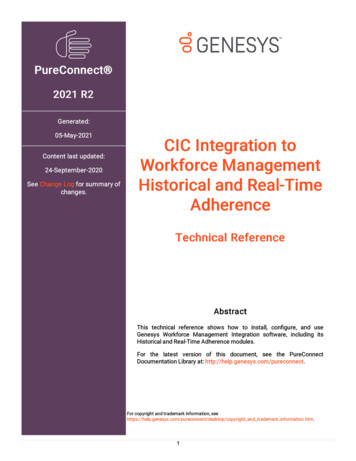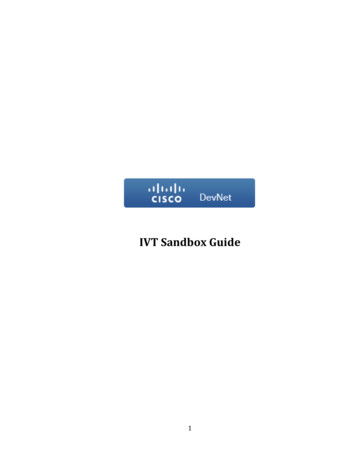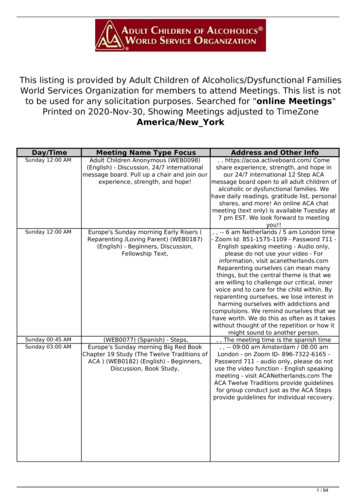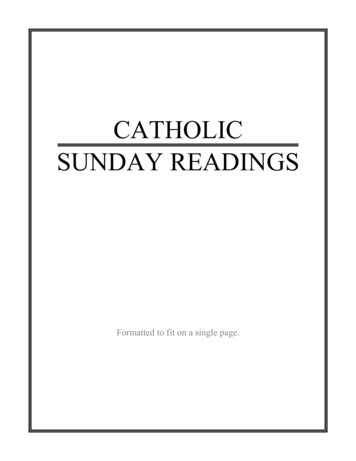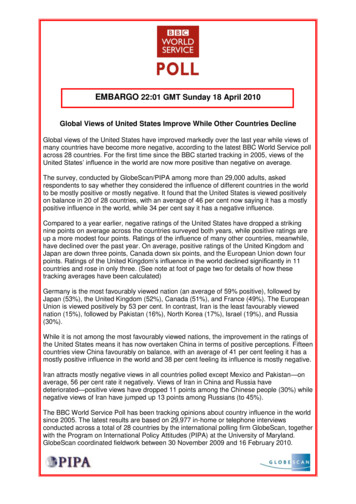
Transcription
EMBARGO 22:01 GMT Sunday 18 April 2010Global Views of United States Improve While Other Countries DeclineGlobal views of the United States have improved markedly over the last year while views ofmany countries have become more negative, according to the latest BBC World Service pollacross 28 countries. For the first time since the BBC started tracking in 2005, views of theUnited States‘ influence in the world are now more positive than negative on average.The survey, conducted by GlobeScan/PIPA among more than 29,000 adults, askedrespondents to say whether they considered the influence of different countries in the worldto be mostly positive or mostly negative. It found that the United States is viewed positivelyon balance in 20 of 28 countries, with an average of 46 per cent now saying it has a mostlypositive influence in the world, while 34 per cent say it has a negative influence.Compared to a year earlier, negative ratings of the United States have dropped a strikingnine points on average across the countries surveyed both years, while positive ratings areup a more modest four points. Ratings of the influence of many other countries, meanwhile,have declined over the past year. On average, positive ratings of the United Kingdom andJapan are down three points, Canada down six points, and the European Union down fourpoints. Ratings of the United Kingdom‘s influence in the world declined significantly in 11countries and rose in only three. (See note at foot of page two for details of how thesetracking averages have been calculated)Germany is the most favourably viewed nation (an average of 59% positive), followed byJapan (53%), the United Kingdom (52%), Canada (51%), and France (49%). The EuropeanUnion is viewed positively by 53 per cent. In contrast, Iran is the least favourably viewednation (15%), followed by Pakistan (16%), North Korea (17%), Israel (19%), and Russia(30%).While it is not among the most favourably viewed nations, the improvement in the ratings ofthe United States means it has now overtaken China in terms of positive perceptions. Fifteencountries view China favourably on balance, with an average of 41 per cent feeling it has amostly positive influence in the world and 38 per cent feeling its influence is mostly negative.Iran attracts mostly negative views in all countries polled except Mexico and Pakistan—onaverage, 56 per cent rate it negatively. Views of Iran in China and Russia havedeteriorated—positive views have dropped 11 points among the Chinese people (30%) whilenegative views of Iran have jumped up 13 points among Russians (to 45%).The BBC World Service Poll has been tracking opinions about country influence in the worldsince 2005. The latest results are based on 29,977 in-home or telephone interviewsconducted across a total of 28 countries by the international polling firm GlobeScan, togetherwith the Program on International Policy Attitudes (PIPA) at the University of Maryland.GlobeScan coordinated fieldwork between 30 November 2009 and 16 February 2010.
GlobeScan Chairman Doug Miller comments: ―People around the world today view theUnited States more positively than at any time since the second Iraq war. While still wellbelow that of countries like Germany and the UK, the global standing of the US is clearly onthe rise again.‖Steven Kull, director of PIPA, comments, ―While China‘s image is stuck in neutral, Americahas motored past it in the global soft-power competition.―After a year, it appears the ‗Obama effect‘ is real. Its influence on people‘s views worldwide,though, is to soften the negative aspects of the United States‘ image, while positive aspectsare not yet coming into strong focus.‖Participating CountriesIn Azerbaijan, Brazil, Central America (Costa Rica, El Salvador, Guatemala, Honduras, Nicaragua,Panama), Chile, China, Egypt, Mexico, the Philippines, Thailand, and Turkey, urban samples wereused.Note on the calculation of tracking averagesThe year-on-year shift in average views of countries cited in paragraph 3 above isbased on the views of the 23 countries in which these questions were asked both in2009 and 20101.All other average figures cited above represent the views across all 28 countriessurveyed this year.Where a country was asked to rate itself, these views have not been included in theaverage views cited here.1Please see the methodology section for a full list of the countries surveyed in 2010 and 2009.2
Detailed FindingsWhile positive views of the UnitedStates increased in most countriespolled, the most significant increaseswere in Germany (up from 18% in2009 to 39% this year), in Russia (upfrom 7% to 25%), in Portugal (up from43% to 57%) and in Chile (up from42% to 55%) with negative perceptionsalso falling significantly.The only countries where perceptionsof the United States became morenegative overall were Turkey (wherethe proportion with positive perceptionsof the United States fell from 21 percent to 13 per cent and negativeperceptions increased from 63 to 70per cent), and in India (where positiveperceptions dipped from 43 per cent to39 per cent and negative viewsincreased from 20 to 28 per cent).The only two countries to havemajorities with negative views of theUnited States are Turkey (70%) andPakistan (52%). Russia is also quitenegative (50%).Last year‘s poll found that views of both Russia and China had deteriorated. Looking at theviews of the countries polled in both 2009 and 2010, they appear to have stabilizedsomewhat this year. Views of Russia in particular are more muted, with a decline both in theproportion of those rating it positively (from 31 to 29%) and those rating it negatively (42 to37%). China‘s positive ratings remain at 40 per cent, while its negative ratings have fallen alittle, to 38 per cent.European countries continue to have quite negative views of China, including Italy (72%negative), Germany (71%), France (64%), Spain and Portugal (both 54%) as do SouthKoreans (61%) and Americans (51%). In Africa, views are quite positive with majoritiesviewing it positively in Kenya and Nigeria (both 73%) and in Ghana (63%).Views of the European Union remain mostly positive in almost all countries polled (53%overall). But there is a difference of views toward the European Union among the Europeannations surveyed, with Germany (76%) and France (74%) the most positive about itsinfluence, Italy (64%) and Spain (62%) a little less favourable and the United Kingdom (54%)much less upbeat about it. Turkey—which is also highly negative about most othercountries—also rates the European Union unfavourably (with only 29% positive).In total 29,977 citizens in 28 countries, were interviewed face-to-face or by telephonebetween 30 November 2009 and 16 February 2010. Nations were rated by half samples inall countries polled. Polling was conducted for BBC World Service by the international pollingfirm GlobeScan and its research partners in each country. In ten of the 28 countries, thesample was limited to major urban areas. The margin of error per country ranges from /-2.1to 6.9 per cent, 19 times out of 20.For more details, please visit www.GlobeScan.com or www.WorldPublicOpinion.org as wellas the GlobeScan Insights blog at http://globescaninsights.blogspot.com.3
Long-Term TrackingOf the 28 nations surveyed in this year‘s poll, 14 are countries that have been surveyedeach year since the poll began in its current form in early 2005. Looking only at thesecountries illustrates how opinion has shifted over time.The most striking trend can be seen in views of the United States. Perceptions of the UnitedStates in these tracking countries deteriorated sharply in the middle years of this decade. In2005, 38 per cent of those in tracking countries thought that United States‘ influence waspositive, but this dropped sharply to just over a quarter (28%) by 2007. It has sincerecovered this lost ground and this year 40 per cent see United States‘ influence in the worldas mostly positive.At the same time, views of China in these long-term tracking countries have continued todecline sharply. In 2005, a little less than half (49%) considered that Chinese influence in theworld was mostly positive, but this fell to 39 per cent in 2006 and to 34 per cent in 2009,before remaining steady this year. In contrast, ratings of India have been more stable, risingfrom 35 per cent to 42 per cent between 2006 and 2007 and slipping back only slightly to 40per cent last year and this.Trends for other countries are less clear-cut. Positive ratings of the United Kingdom in longterm tracking countries dropped from 51 per cent to 46 per cent between 2005 and 2006before increasing to 55 per cent in 2009—but they have fallen off this year and now stand at51 per cent.4
QuestionnaireI would now like to ask your impressions of some specific countries.M1A Please tell me if you think each of the following countries are having a mainly positiveor mainly negative influence in the world:ROTATEat) China01 Mainly positive02 Mainly negativeVOLUNTEERED (DO NOT READ)03 Depends04 Neither, neutral99 DK/NAbt) Francect) The United Statesdt) The European Unionet) Japanft) Israelgt) North Koreaht) CanadaM1B Please tell me if you think each of the following countries are having a mainly positiveor mainly negative influence in the world:ROTATEat) The United Kingdom01 Mainly positive02 Mainly negativeVOLUNTEERED (DO NOT READ)03 Depends04 Neither, neutral99 DK/NAbt) Russiact) Indiadt) Iranet) Brazilft) Pakistangt) Germanyht) South Africai) South Korea5
Backgrounder: Country-by-Country Results2The United StatesViews of the USA are now positive in mostcountries around the world for the first timesince tracking began. Nineteen countriesgive US influence positive ratings, while sixlean negative and two are divided. In the 27country average, 46 per cent view USinfluence positively and 34 per cent view itnegatively. This represents a substantialimprovement over 2009. Among countriespolled in both 2009 and 2010, positive viewshave increased four points and negativeviews have decreased nine points. In 2009,12 countries had negative views, with sixexpressing positive views and two divided.Movements have been especially marked inEurope. While a majority of Spaniards(56%) had a negative view, this hasdropped 23 points so that views now leanpositive (40% positive, 33% negative).Similarly while France had a majoritynegative view last year (53%) this hasdropped 14 points; now the French leanpositive (45% to 39%). The United Kingdomhas gone from leaning negative (41%positive, 45% negative) to leaning positive(48% to 35%).Other allies have shifted as well. In Canada,formerly a negative majority, views now leanfavourable as positive attitudes have risenby six points (now 44%, up from 38%) andnegative attitudes have fallen by 17 points(now 38%, down from 55%). Japan, whichwas divided in 2009, now leans positive asfavourable views have grown by six points(now 34%, up from 28%) and unfavourableviews have declined by 11 points (now 18%, down from 29%).In Chile, which was divided in 2009, a majority (55%) now holds positive views on USinfluence, up 13 points. Egypt, which leaned negative last year (40% to 48%), now leanspositive (45% to 29%). Only two countries have a majority with a negative view. Turkey has70 per cent with an unfavourable view—up seven points from last year. Pakistan has 52 percent with a negative perspective and just 9 per cent with a positive one. Four countriescontinue to have a negative view: Russia (50%), Mexico (49%), Germany (47%), and China(44%). However, negative views have dropped in Russia (15 points), Germany (18 points),China (14 points), and Mexico (5 points). Besides Turkey, views also worsened in India.India still leans positive (39% to 28%), however negative views have increased by eightpoints and positive views have dropped by four. African countries and the Philippines, whichhave generally been very positive toward US influence, remain stable in these views. Largemajorities are still favourable in Kenya (85%), the Philippines (82%), Ghana (72%), andNigeria (64%).2These summaries provide an overview of how nations are viewed by other countries. They do notreflect a country‘s view of itself.6
ChinaAttitudes toward China remain divided onthe whole. Publics in 12 countries are mostcommonly favourable on Chinese influence,while 12 are negative and three are divided.On average among 27 countries, 41 percent hold positive views and 38 per centhold negative views. Among countriessurveyed both in 2009 and 2010, theaverage remained roughly the same.While in 2009 views of China had declinedconsiderably from the previous year, thisyear, overall, views are largely stable. Thenumber of countries having mostly positiveor mostly negative views of China‘sinfluence was also about equal (ten positive,nine negative, and one divided). For thelong-term tracking countries, on average,there was no change in positive views overthe last year, while negative views incheddown two points.However underlying this aggregate stability,there have been significant shifts in views ofChina within different countries.Filipinos have made a sharp reversal inviews of China. While in 2009 a majority(52%) took a negative view this hasdropped 21 points. Now a majority (55%)has a positive view (up 16 points). While in2009 Japan had a clear majority with anegative view (59%), this has dropped aremarkable 21 points, so that now just 38per cent have a negative view. Positiveviews climbed from 8 to 18 per cent.Europe continues to be the region that is the most negative toward China but negative viewshave softened in Portugal (now 54%, down from 62%), and France (64%, down from 70%).In addition, positive views have increased among Germans (now 20%, up from 11%),although a large majority (71%) remains negative. But in Italy and Spain already low positiveviews have decreased by seven points so that just 14 per cent in Italy and 22 per cent inSpain view China‘s influence as favourable.Negative views continue to predominate, but have nonetheless softened in Canada (now41%, down from 58%), Turkey (now 47%, down from 64%). The minority holding negativeviews in Indonesia has declined to 29 from 37 per cent (43% positive). While Australiansleaned positive in 2009 (47% to 37%) they now lean negative (36% positive, 43% negative).Similarly Indians went from leaning positive (30% to 24%) with many not answering, toleaning negative (30% to 38%) with more people answering. South Koreans are among themost negative toward China (61%) negative. This is up 11 points from when they were lastpolled in 2008. In Ghana and Central America views are still mostly positive, but less so. InGhana, positive views have dropped 12 points (now 63%, down from 75%). In CentralAmerica positive views slipped from 62 to 57 per cent, with negative views climbing tenpoints. The USA remains barely negative in its views toward China, with a slightunfavourable majority (51%), which is roughly unchanged from 2009 (52%).7
JapanJapan continues to have very positiveratings globally. Twenty-five of the countriesgive Japan‘s influence a positive rating,while only one country, China, leansnegative and one is divided. On average, 53per cent view Japanese influence positivelyand 21 per cent negatively.Looking at the average of the 22 trackingcountries, positive views are down threepoints but negative views remain virtuallyunchanged. Last year, out of 20 countries16 gave Japan a positive rating, two werenegative, and two were divided.China is the only country with a balance ofnegative views about Japan and theseviews have even worsened. Positive viewsthere have fallen 11 points (29%, down from40%), while almost half the public remainnegative (now 47%, down from 50%).However under this generally stable andpositive view there have been substantialchanges. Four countries have shownmarked improvements in their views ofJapan. In Germany, views have moved fromdivided to positive, with a 12-point increasein positive views (now 50%, up from 38%)and no significant change in negative views.In Turkey, views have changed fromnegative to divided, with a 12-point declinein negative views (35% down from 47%).And in South Korea—which was last polledin 2008—views have warmed, shifting fromnegative to positive with a 27-point rise inpositive views (now 64%, up from 37% in2008) and a 23-point fall in negative views (now 29%, down from 52%). Russia‘s positiveviews have risen from 49 to 58 per cent.Positive views are virtually unchanged while negative views have fallen eight points in theUSA (now 11%, down from 19%); seven points in the Philippines (10%, down from 17%).Favourable views have cooled but still lean positive in Spain where positive views havefallen 19 points (now 42%, down from 61%) and negative views have risen ten points (now29%, up from 19%). In both Italy and India, positive views are down 11 points and negativeviews up eight and nine points, respectively. Positive views are down nine points in CentralAmerica (now 54%, down from 63%) and negative views up eight points (now 27%, up from19%).In two other countries, positive views have fallen but negative views are virtually unchanged.Positive views have dropped 14 points in Ghana (now 53%, down from 67%), and 11 pointsin Canada (now 59%, down from 70%).8
North KoreaAttitudes toward North Korea remain widelynegative. Publics in 23 countries arenegative about North Korea‘s influence,while in two countries views are positive andin three they are divided. On averageamong 28 countries, 48 per cent see NorthKorea‘s influence as mainly negative while17 per cent think it mainly positive.In the previous year, 14 countries hadnegative views, just one had a positive viewand six were divided. Positive views havedropped three points on average since lastyear; negative views are virtually stable.Of greatest note is that views in China—amajor patron of North Korea—have movedin a sharply negative direction. While lastyear Chinese views were divided, positiveviews have plunged 18 points (from 42 to24%), so that the Chinese clearly lean to thenegative (positive 24%, negative 40%).Chinese approval of North Korea is now thelowest recorded over the last four years.Another country important to North Korea—Russia—has also shifted in a negativedirection. Similar to China, while in 2009views were divided, negative views haverisen 15 points (35%, up from 20%). NowRussians lean to a negative view (19%positive, 35% negative).Two other countries have also cooledtoward North Korea. In Egypt, negativeviews have risen eight points (now 36%, upfrom 28%). In Ghana, positive views havefallen 18 points (now 25%, down from 43%) and negative views have risen eight points(32%, up from 24%), moving a public once favourably disposed into leaning negative.Publics in two countries have shifted in a positive direction toward North Korea. In Indonesiathe public has gone from negative to divided, with negative views falling eight points (from36% to 28%). And in Nigeria attitudes have gone from divided to positive, with negativeviews dropping six points (29%, down from 35%).Of the 23 countries with a preponderance of negative views, the ones with the largestmajorities are South Korea and Japan (both 90%), followed by Germany (86%), France(73%), the USA (70%), and Australia (65%). Just two countries are on balance positivetoward North Korea: Azerbaijan (25% positive, 19% negative) and Nigeria (35% positive,29% negative). Three publics are divided: Indonesia, Chile and Central America.9
United KingdomViews of the United Kingdom are positive inmost countries around the world, a view thathas dimmed only slightly since last year. Of27 countries polled, 24 give the UnitedKingdom‘s influence positive ratings, whilethree lean negative. On average, 52 percent view the UK positively and 20 per centview it negatively.Among countries polled in both 2009 and2010, positive views have decreased threepoints and negative views remainunchanged.The most dramatic changes have occurredin China and Russia, though in oppositedirections. In China positive views haveplunged a striking 16 points, though a baremajority (51%) continues to have a positiveview of the United Kingdom (negative 21%).In Russia positive views have climbed 12points—also to a 51 per cent positive(negative 14%).Views have gone from warm to warmer intwo countries. Among Nigerians, positiveviews have risen nine points (72%, up from63%). Among the French, positive viewshave risen eight points (67%, up from 59%).Views lean positive and remain virtuallyunchanged in six countries: Ghana, Italy,Chile, Indonesia, Japan, and India.Views have gone from warm to less warm innumerous countries. Among Canadians,positive views have dropped 12 points (now62%, down from 74%). In Spain, positive views have fallen ten points (now 53%, down from63%). In Portugal, positive views have fallen seven points (now 50%, down from 57%). InEgypt, positive views fell eight points (now 50%, down from 58%). Among Kenyans, positiveviews have fallen eight points (now 79%, down from 87%). In the Philippines, positive viewshave fallen nine points (now 58%, down from 67%). Among Australians, positive views fellseven points (now 62%, down from 69%). In all these countries, though, negative viewshave not increased; more now say ―it depends‖ or decline to answer.Though negative views have increased in Germany and Central America, attitudes still leanpositive. In Germany, negative views have risen nine points (now 27%, up from 18%) but amajority (53%) is still positive (down from 59%). Though views lean positive in CentralAmerica, negative views rose nine points (now 30%, up from 21%).Three countries had negative views of the United Kingdom. A majority of Turks remainnegative, though this majority has declined (now 53%, down from 59%), with positive viewsalso lower (18%, down from 24%) and more taking no position. Views in Mexico werevirtually unchanged but still lean negative. Pakistan also leans negative on the UnitedKingdom‘s influence (38% negative, 9% positive) with many taking no position.10
PakistanViews of Pakistan remain quite negativeand, overall, largely unchanged from lastyear. Twenty-three countries give Pakistan‘sinfluence a negative rating, two countrieslean positive and two are divided. In 2009,only one of 23 countries leaned positive andtwo countries were divided. In the 27country average, 51 per cent view Pakistaniinfluence negatively and 16 per cent view itpositively.Among countries polled in both 2009 and2010, positive views are down two pointsand negative views are down four points.Views have worsened in India and Russia.In India, negative views have risen 14 points(from 49% to 63%). Among Russians,negative views are up nine points (from 37%to 46%).In two countries, views have improvedsignificantly. Kenyans moved from anunfavourable view to being divided, with anine-point increase in positive views (now39%, up from 30%), and an 11-pointdecrease in negative views (now 37%, downfrom 48%). Indonesians have shifted frombeing divided to leaning favourable, aspositive views have risen six points (now36%, up from 30%) and negative views havedropped slightly (now 26%, down from29%).Negative views are significantly lower inseven countries, though positive views havenot gone up. These include Australians,(54%, down from 63%), Canadians, (49%, down from 63%), Americans (58%, down from69%), Britons, (44%, down from 54%), Portuguese, (57%, down from 72%), Spain, (70%,down from 78%), and Filipinos (61%, down from 71%). In all these countries, neutral viewsand non-responses are up compared to last year.A slight increase in negative views has moved Nigeria from divided in 2009 (32% positive,35% negative) to leaning negative (32% positive, 40% negative) in 2010.Among Egyptians, positive views have fallen 11 points (now 14%, down from 25%), butnegative views dropped as well (now 36%, down from 41%). Those saying ―It depends‖ haverisen 16 points (now 30%, up from 14%).11
IndiaWorldwide, views of India lean onlymodestly to the positive, barely edging outviews of China. Among 27 countries polled,15 are positive about India‘s influence inworld affairs, ten are negative and two aredivided. On average, among 27 countries,36 per cent are positive and 31 per centnegative about India‘s influence. A high 33per cent do not provide an answer or areneutral.Among the tracking countries negativeviews have dropped by four points, butpositive views have also dropped by twopoints, suggesting little net gain.While views of India were fairly negative inEurope in 2009 there has been something ofa warming trend. Among the French,positive views have grown by nine points(now 38%, up from 29%). Germans‘favourable perceptions have increased byten points (now 32%, up from 22%). AmongPortuguese, negative attitudes have fallenby 11 points (now 35%, down from 46%).But in all three cases, views are stillpredominantly negative. Italians‘unfavourable views have fallen by ninepoints (now 34%, down from 43%), shiftingthem from a divided view in 2009 to leaningpositive in 2010.There has been a distinct cooling with itscounterpart, China. While in 2009 viewswere divided there, Chinese favourableviews have fallen by 15 points, so thatnegative views (47%) now strongly outweigh positive ones (29%). China together withPakistan (48% have negative views) have the most negative views of India, followed byGermany (46%).However positive views are up in its other large neighbour, Indonesia (now 50%, from 38%).Filipinos have also warmed a bit with negative feelings decreasing by eight points (45%,down from 53%), but they still largely outweigh positive feelings (28%).In the USA negative views are down by eight points (now 18%, from 26%) and a robust 55%say they have positive views of India. South Korea is the only country with a largerpercentage (56%) saying that they see India having a positive influence.Ghanaians views have had a sharp downturn with positive views decreasing by 24 points(now 33%, from 57%). Australians have also cooled with positive views dropping from 53 to44 per cent. But in both cases positive views continue to prevail.In Central America, unfavourable perceptions have increased by nine points (42%, up from33%) and is the dominant position.12
FranceViews of France are positive in nearly allcountries around the world, an attitude thathas not changed significantly from last year.Of 27 countries polled, 25 gave Frenchinfluence positive ratings, one (Turkey) hada majority with negative views and oneleaned negative. In the 27-country average,49 per cent view French influence positivelyand 19 per cent view it negatively.Among countries polled in both 2009 and2010, on average positive views havedecreased four points; negative views havedecreased two points.Notable increases in positive views arefound in Germany (now 66%, up from 55%),Russia (now 63%, up from 56%), andIndonesia (now 49%, up from 42%). Brazil,which was last polled in 2008, is now 24points more favourable (now 69%, up from45%).Notable decreases in positive views ofFrench influence are found amongCanadians—positive views have fallen 16points (now 51%, down from 67%),Spaniards (now 61%, down from 74%),Portuguese (now 62%, down from 69%),Ghanaians (now 46%, down from 57%), andAustralians (now 47%, down from 56%).After years of steady increases Americanspositive ratings of France have slipped tenpoints (now 42% down from 52%); just 28per cent have a negative view, but this is thefourth highest of all countries polled.The one country with a majority negative view—Turkey—has shown a decrease from 58 to53 per cent in those saying France is having a negative influence. The only other country tolean negative was Pakistan, but only 23 per cent held this position with 12 per cent giving apositive rating and a remarkable two thirds not providing an answer.Curiously, there was a substantial increase in the number of people not providing aresponse or giving a neutral response, thus lowering both positive and negative responsesin four countries. Among Britons, both positive views (48%, down from 55%) and negativeviews (18%, down from 25%) have dropped seven points. Among Egyptians, positive viewsare down nine points (42%, down from 51%) and negative views down five points (13%,down from 18%). In China, positive views fell six points (38%, down from 44%) and negativeviews fell 21 points (24% down from 45%). In the Philippines, positive views have fallen ninepoints (45%, down from 54%) and negative views have dropped seven points (22%, downfrom 29%).13
South AfricaViews of South Africa have warmedsomewhat from last year. Of the 28 countriespolled in 2010, 11 countries give SouthAfrican influence a positive rating, fivecountries lean negative, and 12 countries aredivided. In the 28-country average, 34 percent view South African influence positivelyand 27 per cent view it negatively.Among countries polled in both 2009 and2010, negative views are down five points onaverage, though positive views remainunchanged.South Africa is especially popular among itsneighbours with majorities saying that it ishaving a positive influence in Kenya (79%),Nigeria (59%), and Ghana (51%). Positiveviews in Ghana, though, are down ninepoints.In no country does a majority have anegative view though views lean close tomajority negative in the Philippines,Germany and Brazil.Views have shifted from negative to positivein Canada and the United Kingdom. InCanada, negative views have fallen 14points (28%, down from 42%). AmongBritons negative views have fallen 22 points(25%, down from 47%), while positive viewshave risen six points (36%, up from 30%).Ratings have shifted from divided to positivein France and Portugal, as well as CentralAmerica. In France, positive views have risen 14 points (52%, up from 38%), and negativeviews are down ten points (25%, do
polled in both 2009 and 2010, positive views have increased four points and negative views have decreased nine points. In 2009, 12 countries had negative views, with six expressing positive views and two divided. Movements have been especially marked in Europe. While a majority of Spaniards (56%) had a negative view, this has
